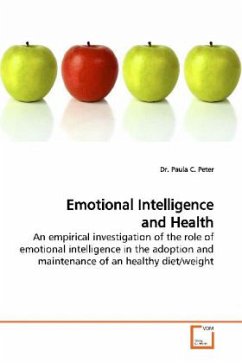In this book, we explore the role of emotional
intelligence as a new possible avenue of research
related to the adoption and maintenance of a healthy
diet/weight. Emotional Intelligence is defined as the
ability to perceive, use, understand and regulate
emotions (Mayer and Salovey 1997) and appears to
contribute to quality decision making and performance
in multiple domains (Goleman 1995). Few studies,
however, offer empirical evidence.
We conducted four empirical studies and examined the
role of emotional intelligence in decision making and
performance related to health (adoption and
maintenance of an healthy diet/weight).
Our findings suggest the salience of the role of
specific emotional intelligence abilities in decision
making and performance related to health. A training
intervention on emotional intelligence and health
seems to activate mechanisms that might help people
to use their knowledge in the right direction (i.e.
adoption/maintenance of a healthy diet/weight).
intelligence as a new possible avenue of research
related to the adoption and maintenance of a healthy
diet/weight. Emotional Intelligence is defined as the
ability to perceive, use, understand and regulate
emotions (Mayer and Salovey 1997) and appears to
contribute to quality decision making and performance
in multiple domains (Goleman 1995). Few studies,
however, offer empirical evidence.
We conducted four empirical studies and examined the
role of emotional intelligence in decision making and
performance related to health (adoption and
maintenance of an healthy diet/weight).
Our findings suggest the salience of the role of
specific emotional intelligence abilities in decision
making and performance related to health. A training
intervention on emotional intelligence and health
seems to activate mechanisms that might help people
to use their knowledge in the right direction (i.e.
adoption/maintenance of a healthy diet/weight).








